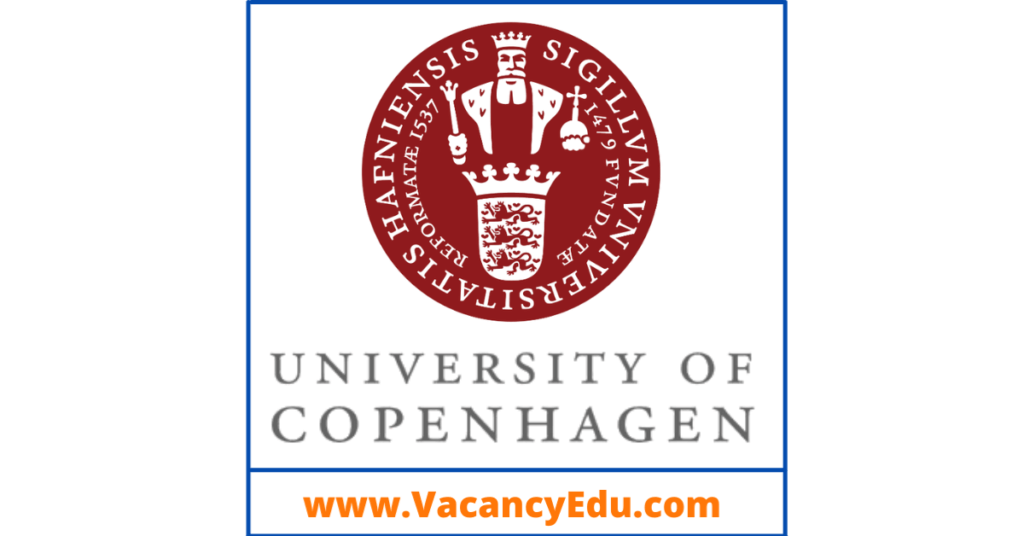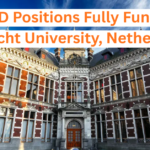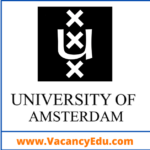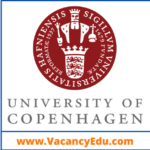University of Copenhagen, Denmark invites online Application for number of Fully Funded PhD Degree at various Departments. We are providing a list of Fully Funded PhD Programs available at University of Copenhagen, Denmark.
Eligible candidate may Apply as soon as possible.
(01) PhD Degree – Fully Funded
PhD position summary/title: PhD fellowship in Environmental Toxicology
It is impossible to assess the risk of all chemical pollutants to all species in the environment at all sorts of environmental conditons. Chemical risk assessments therefore depend on models which can predict the chemical fate and biological effect across species and endpoints. Several models exsist but few are fully evaluated for their ability to predict fate and effects under nature like conditions. The overall aim of QTOX is to address the robustness of models based on mechanistic knowledge of the underlying processes in the chain from exposure to effects, across all levels of biological organisation, with close connection to regulatory endpoints, and under environmentally realistic conditions, i.e., including the dynamics of chronic exposures to mixtures of chemicals. The robustness of all models will be evaluated on microcosm scenarios under two environmental regimes in Spain and Holland, respectively. Read more about the project on www.qtox.eu The objective of the current PhD is to establish the relationships between different species of aquatic plants and algae in terms of vulnerability, time to effect and recovery times when exposed to chemicals specifically targeting primary producers (herbicides and metal complexes such as Cu-pyrithione and Zn-pyrithione).
Deadline : 16 December 2022
(02) PhD Degree – Fully Funded
PhD position summary/title: PhD fellowship in Environmental Toxicology
It is impossible to assess the risk of all chemical pollutants to all species in the environment at all sorts of environmental conditons. Chemical risk assessments therefore depend on models which can predict the chemical fate and biological effect across species and endpoints. Several models exsist but few are fully evaluated for their ability to predict fate and effects under nature like conditions. The overall aim of QTOX is to address the robustness of models based on mechanistic knowledge of the underlying processes in the chain from exposure to effects, across all levels of biological organisation, with close connection to regulatory endpoints, and under environmentally realistic conditions, i.e., including the dynamics of chronic exposures to mixtures of chemicals. The robustness of all models will be evaluated on microcosm scenarios under two environmental regimes in Spain and Holland, respectively. Read more about the project on www.qtox.eu
Deadline : 16 December 2022
View All Fully Funded PhD Positions Click Here
(03) PhD Degree – Fully Funded
PhD position summary/title: PhD fellowship in Uncovering mechanisms of cachexia and insulin resistance in patients with lung cancer at the Department of Biomedical Sciences, University of Copenhagen
While often overlooked, metabolic dysfunction is a comorbidity of many types of cancer. Disruption of glucose metabolism and insulin resistance in cancer is concerning as they are strongly associated with reduced survival and a higher cancer recurrence rate. Furthermore, cancer patients with loss of muscle mass (cachexia) have an increased risk of multiple adverse outcomes, including decreased survival. For this PhD fellowship we are looking for a candidate that will engage in three research studies that as a whole will bring new insight to the metabolic and endocrine dysfunction in patients with cancer cachexia, all being patients with advanced non-small cell lung cancer (NSCLC) treated with palliative and life-prolonging intend at the Department of Oncology at Rigshospitalet. This population has a median age of 71 years, some with pronounced comorbidity, but all with a performance status that allows for anticancer treatment (PS0-2).
Deadline : 10-12-2022
(04) PhD Degree – Fully Funded
PhD position summary/title: Marie Curie PhD fellowship in NAD and Aging (DNA damage)
DNA damage accumulates with age and may contribute to age-associated diseases. A major DNA damage responsive enzyme is poly-ADP-ribose polymerase 1 (PARP1). Activation of PARP1 may contribute to decline of NAD with age however it is unclear how PARP activation can contribute with this in a steady state system. This PhD project will focus on understanding how DNA damage might impact systemic changes in NAD levels across tissues, a critical point for our ability to treat age-associated diseases.
Deadline : December 6, 2022,
Polite Follow-Up Email to Professor : When and How You should Write
(05) PhD Degree – Fully Funded
PhD position summary/title: Marie Curie PhD fellowship in NAD and Aging (loss of NAD)
The main goal of the NADIS consortium is to train the next generation of metabolic researchers, providing them with in-depth knowledge and cross-disciplinary expertise to combat disease. The research projects will specifically focus on the metabolism of NAD+, a central redox cofactor and enzymatic substrate that plays an essential role in virtually all major cellular functions. The limited knowledge on the interplay between NAD+ and the cellular processes in which it is involved, especially those that lead to disease, requires novel experimental and analytical tools combined with a strong interaction between scientists and clinical staff coming from different disciplines. We aim to fill these gaps by training ten highly skilled ESRs. To do this, we bring together our expertise in molecular and cellular biology, bioinformatics, and Artificial Intelligence (AI), omics, drug development and nutritional/clinical applications. Our non-academic beneficiaries are focused on the development of nutrition products, medical foods, and drug development for new therapies. We will also provide ESRs with transferable and networking skills, and first-hand experience of industrial applications, enabling them to become future leading scientists at the forefront of metabolic research and, specifically, NAD+ research in Europe.
Deadline : December 6, 2022,
(06) PhD Degree – Fully Funded
PhD position summary/title: PhD fellowship in Physics/Biocomplexity
The project aims at uncovering universal characteristics and laws in life systems, in particular in adaptation, development, and evolution with the spirit of theoretical physics, by focusing on consistency between hierarchical levels – molecules, cells, organisms, and ecosystem. The ideal candidate will have a strong theoretical physics background, in particular statistical physics and dynamical systems. Previous knowledge of biology is not necessarily required, although high motivation to understand a life system with willingness to learn is needed. Our research project is theoretical, by taking analytical, numerical, or data-driven approaches, with possible collaboration with experimental groups.
Deadline : 1 December 2022,
Click here to know “How to Write an Effective Cover Letter”
(07) PhD Degree – Fully Funded
PhD position summary/title: PhD positions available at reNEW Copenhagen Node
We are looking for individuals interested in focusing on enhancer networks in early human development and human organ specific differentiation. As a PhD student in the Brickman group, you will be working in the field of stem cell and developmental biology. You will be part of an international interdisciplinary team of scientists focusing on understanding the transcriptional basis for development and exploiting this to develop new technologies for cell type specification in culture. We employ both mouse and human model systems in vitro and in vivo, where the advertised positions will focus on the use of three-dimensional synthetic models for human development. Specifically, the first project will focus on human hypoblast and stem cell-based embryo models and the second, VFGs as a model for the more effective differentiation of pluripotent stem cells to hepatic and pancreatic organoids. The positions will use a combination of cell culture, molecular biology, microscopy and next generation sequencing (NGS) technologies. There are also opportunities to explore both projects computationally.
Deadline : 1 December 2022.
(08) PhD Degree – Fully Funded
PhD position summary/title: PhD fellowship in Systems Neuroscience at the Department of Neuroscience
We are seeking a highly motivated student for a project addressing the generation and functions of theta oscillations in spatial navigation using systems neuroscience and population-level approaches. The research will take place at the Department of Neuroscience (in.ku.dk) at University of Copenhagen in the lab of Dr. Peter C. Petersen (PetersenLab.org). The project involves performing electrophysiological recordings from freely moving animals using chronically implanted high-density Neuropixels silicon probes and applying optogenetics for single cell tagging, and behavioral manipulations.
Deadline : 22 November, 2022,
(09) PhD Degree – Fully Funded
PhD position summary/title: PhD Fellowship in Clinical Translational Metabolism at Department of Biomedical Sciences
The position is available in the Clinical Translational Metabolism Group headed by Professor Signe Torekov. In our group, we aim at bridging between biomedical research and clinical practice and prevention in obesity. By conducting clinical experimental interventions that characterizes and integrates the complex pathophysiology behind obesity, and by securing synergistic and fruitful collaborations, we strive to identify prevention, causalities and optimal treatment options for individuals living with obesity.
Deadline : 21 November 2022,
(10) PhD Degree – Fully Funded
PhD position summary/title: PhD fellowship in Functional Proteomics
We seek an enthusiastic, passionate researcher to perform a PhD project in functional proteomics. The main objective of the PhD project is to identify and understand subcellular organelle level protein dynamics of insulin and exercise stimulated skeletal muscle. The successful applicant will apply sucrose gradient fractionation, proteomics, bioinformatics and microscopy techniques on skeletal muscle tissue and work in an interdisciplinary team comprising molecular biologists, bioinformatics and cell biologist.
Deadline : 16 November 2022
Connect with Us for Latest Job updates
(11) PhD Degree – Fully Funded
PhD position summary/title: PhD fellowship in molecule-mineral interactions at GLOBE Institute
The aim of this project is to investigate why minerals can stabilize DNA across space and time and how to utilize that knowledge for the research field of sedimentary ancient DNA. You will be using liquid cell atomic force microscopy in combination with other nano to microlevel and bulk approaches to probe the underlying mechanisms driving DNA preservation and degradation when associated with different mineral surfaces. You will perform in-situ degradation experiments by e.g. introducing enzymes and study the degradation and stability of the DNA-mineral interactions in a range of environmental relevant conditions. You will also probe molecule-mineral binding forces and general adsorption behaviours. You will have the possibility to be involved in protein-mineral stabilization studies and to partake in understanding bacterial preference toward different natural surfaces in relation to understanding biofilm propagation. It will be expected that you have a drive for experimental work and an interest in adsorption dynamics and mechanisms at the nano and molecular level.
Deadline :15 November 2022,
(12) PhD Degree – Fully Funded
PhD position summary/title: PhD stipends in Statistics, and the mathematics of Insurance and Economics
There will be a limited number of PhD stipends not attached to specific projects..
In addition, there will be PhD stipends available in:
- Actuarial science within the project frame InterAct (contact Mogens Steffensen, mogens@math.ku.dk)
- Causality in event driven dynamical systems (contact Niels Richard Hansen, Niels.R.Hansen@math.ku.dk)
- Statistical and causal methodology for complex data structures with applications to microbiome data analysis (contact Niklas Pfister, np@math.ku.dk)
Deadline : 15-11-2022
List of Top 25 Free Statistical Analysis Software
(13) PhD Degree – Fully Funded
PhD position summary/title: PhD stipends in Mathematics
There will be PhD stipends available in:
- Algebraic and Arithmetic Geometry, Applied algebra, Combinatorics, Geometric group theory, Geometry and Geometric Analysis, Number Theory, Representation Theory, and Topology as covered by the section Algebra & Geometry and Copenhagen Center for Geometry & Topology (GeoTop).
- Classical Analysis, Descriptive Set Theory, Functional Analysis, Geometric group theory, Harmonic Analysis, History of Mathematics, Mathematical Physics, Operator Algebras, Partial Differential Equations, Quantum Information, Quantum Computation, Quantum Simulation and Random Matrix Theory as covered by the section Analysis and Quantum, the Centre for the Mathematics of Quantum Theory funded by the Villum Foundation and the ‘Quantum for Life‘ Center funded by the Novo Nordisk Foundation.
Deadline : 15 November 2022
(14) PhD Degree – Fully Funded
PhD position summary/title: PhD fellowship in Geoinformatics/Remote Sensing
Savanna ecosystems host 20% of the Earth’s human population, cover around 20% of the Earth’s surface and include the majority of global rangelands used for livestock production. Also, savannas contribute 30% to the total terrestrial net primary production, and are therefore key in quantifying the global carbon cycle. Savanna ecosystems are characterized by the balanced coexistence of woody and herbaceous vegetation, the distribution and abundance of which are controlled by land management, climate and possibly also increasing atmospheric CO2 concentrations. Changes in any of these controlling factors can lead to an imbalance of a long established coexistence, and global change. The complex interactions between the forcing mechanisms of the observed changes in savanna ecosystems are not well understood, but is key in understanding the consequences for livestock production and subsistence of indigenous communities. Given the pressures of climate change and population growth, there is an urgent need for this research to support adaptation and mitigation strategies as highlighted in the global goals for sustainable development. The CLISA project aims at developing satellite remote sensing-based techniques for detailed characterization of global savanna woody vegetation dynamics and carbon stocks over recent decades used to analyze forcing mechanisms of savanna vegetation dynamics.
Deadline :15th November 2023
(15) PhD Degree – Fully Funded
PhD position summary/title: PhD fellowship in protein crops for plant based food
There is an increasing demand for local, high-quality and well-tasting organic plant-based food. Pea is a promising candidate as a protein crop and is a valuable crop in organic farming creating resilient crop rotations, providing nitrogen input through nitrogen fixation and increasing soil fertility. Still, peas grown for direct human consumption is limited. The target of the project is to realize the immense potential of old pea cultivars for consumption thereby making organic high-quality and well-tasting peas available for the consumers and to secure a profitable and stable production for the organic farmer.
Deadline : 15 November 2022
(16) PhD Degree – Fully Funded
PhD position summary/title: PhD fellowship in “Testing new tool-based gene therapy of Recessive dystrophic epidermolysis bullosa in a human 3D skin model” at the Department of Cellular and Molecular Medicine
For the clinical application of genome editing, the genome editing tools must reach the target cells efficiently and selectively. Viruses, lipid nanoparticles, and viral particles are currently investigated and optimized to execute this task, but genetic engineering of tissues in vivo is still challenging. This project aims to test current improvements for HDR-dependent CRISPR genome editing developed by our consortium (different small molecules, different Cas9 fusion proteins, different viral vectors) on human tissues using 3D skin tissue model systems built with keratinocytes that carry a Recessive Dystrophic Epidermolysis Bullosa (RDEB) causing mutation. The project also involves applying new genetic engineering strategies to conditions affecting glycogenes and cell-specific applications through targeting glycans.
Deadline : 15 November 2022,
Top 14 Best Citation Manager 2022
(17) PhD Degree – Fully Funded
PhD position summary/title: Research assistant and PhD fellowship in Population and forensic genetic applications of mtDNA
The PhD project will focus on the applications of mtDNA analysis in population genetics and forensic genetic casework. The use of mtDNA in forensic genetics has proven to be an important tool in the analysis of trace samples where nuclear DNA is often degraded and/or present in low amounts. However, interpretation and reporting of mtDNA evidence still faces challenges, particularly regarding inclusion/exclusion scenarios in inconclusive cases, and with respect to reporting heteroplasmy. With the emergence of massively parallel sequencing, the thresholds for detecting and reporting mtDNA heteroplasmy are changing and becoming more sensitive. More data are needed to evaluate and determine new standards for casework. Furthermore, the somatic mutation rates in different human tissues must be explored to improve the interpretation of forensic evidence.
Deadline : November 15th, 2022,
(18) PhD Degree – Fully Funded
PhD position summary/title: PhD fellowship in plant-soil interactions
The rhizosphere, the soil volume in close vicinity of living roots, is the critical plant-soil interface that governs plant productivity and consequently food and fibre production. Plant roots have the ability to alter the physico-chemical environment of the rhizosphere; for example, root release of protons and exudates can change pH and/or chelate metals and enhance the release of sparingly available phosphorus. However, these processes remain poorly understood, in part because measuring them poses substantial challenges. The overall project aim is to quantify root exudation and establish relationships with localized changes in the rhizosphere and their contribution to plant nutrition. The project will take its starting point in quantifying root exudation and its interactions with soil pH and phosphorus mobilization; and aims to conduct research along laboratory, glasshouse, and field conditions along this interface. There will be room for project development incl. methods to achieve the project goals.
Deadline : 14 November 2022,
(19) PhD Degree – Fully Funded
PhD position summary/title: PhD fellowship in Adhesion G protein-coupled receptor signal transduction at the Department of Biomedical Sciences
The project aims to characterize and understand the cellular signaling properties of the adhesion GPCR ADGRL3. ADGRL3 has been implicated in ADHD and other psychiatric disorders that involve dopamine dysfunction, such as schizophrenia. ADGRL3 is expressed in the brain, and is composed of a giant protein structure that both binds ligands across the synapse and controls intracellular signaling. Yet many of ADGRL3 basic functions remain unexplored, and understanding the cellular actions of ADGRL3 is a critical milestone towards future drug development efforts.
Deadline : November 13th 2022
(20) PhD Degree – Fully Funded
PhD position summary/title: PhD scholarship at the Department of Arts and Cultural Studies: “Follow Me”
PhD studies consist of research programmes that qualify students for independent and wide-ranging research, development and teaching at international level. The main emphasis is on PhD students organising and conducting their own research project (under supervision). The programme culminates in the submission of a PhD thesis, which the student must defend in public. The programme is prescribed to 180 ECTS points, corresponding to three years of full-time studies.
A PhD opens up a range of career opportunities in academia and elsewhere. As well as writing a thesis, PhD students work in active research environments in Denmark and abroad. They contribute to the academic environment, take research training courses and convey the results of their research in teaching, at academic conferences and to the general public
Deadline : 13 November 2022
(21) PhD Degree – Fully Funded
PhD position summary/title: PhD fellowship in applied Machine Learning, Information Retrieval and Natural Language Processing
The fellow will join the Information Retrieval Lab at the Machine Learning Section at DIKU. The Machine Learning section has a tradition of being among the leading research environments in Artificial Intelligence and Web & Information Retrieval in Europe (in the top 5 for 2020, according to csrankings.org), with a strong presence at top-tier conferences, continuous collaboration in international & national research networks, and solid synergies with big tech, small tech, and industry. The Machine Learning section consists of a vibrant selection of approximately 65 talented researchers (40 of whom are PhD and postdoctoral fellows) from around the world with a diverse set of backgrounds and a common incessant scientific curiosity and openness to innovation. Moreover, DIKU is internationally leading within Natural Language Processing (ranked 2nd in Europe for the last 5 years, according to CSRankings). The NLP section has a broad portfolio of research, including investigating methods to automatically process, understand, and generate text, with applications including automatic fact-checking, machine translation, question answering, and visually grounded NLP.
Deadline :13 November 2022
About The University of Copenhagen, Denmark – Official Website
The University of Copenhagen is a public research university in Copenhagen, Denmark. Founded in 1479, the University of Copenhagen is the second-oldest university in Scandinavia, and ranks as one of the top universities in the Nordic countries and Europe.
Its establishment sanctioned by Pope Sixtus IV, the University of Copenhagen was founded by Christian I of Denmark as a Catholic teaching institution with a predominantly theological focus. In 1537, it was re-established by King Christian III as part of the Lutheran Reformation. Up until the 18th century, the university was primarily concerned with educating clergymen. Through various reforms in the 18th and 19th century, the University of Copenhagen was transformed into a modern, secular university, with science and the humanities replacing theology as the main subjects studied and taught.
The University of Copenhagen consists of six different faculties, with teaching taking place in its four distinct campuses, all situated in Copenhagen. The university operates 36 different departments and 122 separate research centres in Copenhagen, as well as a number of museums and botanical gardens in and outside the Danish capital. The University of Copenhagen also owns and operates multiple research stations around Denmark, with two additional ones located in Greenland. Additionally, The Faculty of Health and Medical Sciences and the public hospitals of the Capital and Zealand Region of Denmark constitute the conglomerate Copenhagen University Hospital.
A number of prominent scientific theories and schools of thought are namesakes of the University of Copenhagen. The famous Copenhagen Interpretation of quantum mechanics was conceived at the Niels Bohr Institute, which is part of the university. The Department of Political Science birthed the Copenhagen School of Security Studies, which is also named after the university. Others include the Copenhagen School of Theology and the Copenhagen School of Linguistics.
Disclaimer: We try to ensure that the information we post on VacancyEdu.com is accurate. However, despite our best efforts, some of the content may contain errors. You can trust us, but please conduct your own checks too.
Related Posts
- PhD Degree (26)-Fully Funded at Delft University of Technology (TU Delft), Netherlands

- PhD Degree (14)-Fully Funded at Utrecht University, Netherland

- PhD Degree (13) -Fully Funded at University of Amsterdam, Netherlands

- PhD Degree (20)-Fully Funded at Ghent University, Belgium

- PhD Degree (22) -Fully Funded at NTNU, Norway

- PhD Degree (05) -Fully Funded at Aalto University, Finland

- PhD Degree (20) -Fully Funded at Luxembourg, Luxembourg

- PhD Degree (23) -Fully Funded at University of Copenhagen, Denmark

- PhD Degree (31) -Fully Funded at University of Southampton, England











